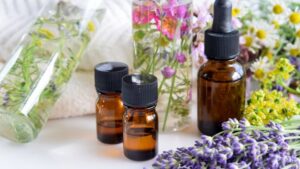Aromatherapy is a holistic healing treatment that uses natural plant extracts to promote health and well-being. It has been used for thousands of years in various cultures around the world, including traditional Chinese medicines, Ayurvedic healing in India, and even ancient Egyptian practices. In modern times, aromatherapy continues to be popular, offering individuals a variety of physical and mental benefits – from reducing stress to aiding relaxation.


Physiological Effects
Aromatherapy works by inhaling the aromatic molecules from essential oils that can stimulate the limbic system of the brain. This system is the part of the brain directly connected with emotion and memories, meaning that scents can evoke strong memories and emotions – both positive and negative. By stimulating this system through inhalation of essential oils, it encourages feelings of relaxation, alertness or calm, depending on the desired effect.
Essential oils are also naturally rich in antibacterial agents that can help support immunity systems when used topically with massage oils or balms. Many herbs have anti-inflammatory properties and have been successfully used to reduce pain associated with conditions such as rheumatoid arthritis, muscle aches and joint pain. There is also evidence to suggest they may be beneficial for colds, flu, headaches and other minor ailments associated with everyday life.
Popular Types of Essential Oils
Lavender oil is one of the most popular essential oils and is well-known for its calming effects. Many people use this oil to reduce stress, improve sleep quality, or help with skin ailments like eczema. Lavender has a pleasant floral scent that many find quite relaxing, making it an ideal choice for aromatherapy.
Peppermint oil is another commonly used essential oil with an invigorating scent and cooling effect that help revive dull senses. Peppermint can also be used in massage to relax tight muscles and eliminate lactic acid build-up after exercise. It can help ease headaches, tackle mental fatigue, and uplift your spirits on a bad day.
Eucalyptus oil is another excellent choice to relieve upper respiratory tract congestion due to respiratory illnesses or allergies. The refreshing aroma helps clear nasal passages and can even soothe sore throats. In addition to its healing benefits, eucalyptus makes a great room freshener!
Tea tree oil has antiseptic properties that make it effective at treating bacterial skin infections or preventing them altogether. As such, tea tree oil is often used on cuts and bruises and other topical treatments as an ointment or compresses. It can also help treat acne and other skin conditions, such as athlete’s foot and warts, when applied topically twice daily before washing off with soap.
Lemon oil has an uplifting scent due to its citric notes that can brighten up one’s mood and energize their spirit when feeling down or anxious. Lemon has cleansing properties as well, so it can be used to disinfect surfaces by adding a few drops to any cleaning solution. Lastly, lemon essential oils are widely known for their ability to reduce inflammation, making them valuable for digestive disorders or troubled skin conditions like rashes and eczema.
Rosemary oil is another popular remedy for mental clarity as it can help increase alertness as well as memory retention since rosemary has stimulating effects on the nervous system. When inhaled from a diffuser, rosemary can act like an all-natural pick-me-up, which is why many students use this essential oil while studying! Rosemary also alleviates stress-related conditions such as headaches and muscle tension, making it a great companion during meditation sessions too!
Sandalwood essential oils have been used in aromatherapy since ancient times due to their sedative quality, which calms nerves while helping one feel relaxed yet energized at the same time. Sandalwood also smells sweetly calming, which makes it great for reducing anxiety levels in tense situations such as public speaking or taking exams!
Ginger root oil is mostly known for nausea relief, but some studies have found that ginger root may also be beneficial in helping digestion problems caused by inflammation within the intestines or stomach lining. Ginger root’s anti-inflammatory properties make this comforting aromatic herb beneficial in fighting gut trouble issues like Crohn’s Disease, Chron’s Syndrome, Irritable Bowel Syndrome (IBS), etcetera.
Chamomile essential oils are best known for their soothing qualities, but they offer more than just relaxation benefits; chamomile essence favors wound recovery too since compounds present within this flowery herb accelerate tissue healing process thanks to the lubrication capacity of anti-inflammatory substances present therein!
Jasmine is a versatile essential oil with a variety of benefits. Its calming, uplifting smell can make it an ideal addition to any romantic setting with its ability to help induce romance and evoke positive emotions. Jasmine is renowned as an aphrodisiac, and while the studies substantiating its effects are few, there is a general consensus that jasmine has value in helping to boost libido and stimulate passion between two people. Additionally, certain preparations featuring jasmine are known for inspiring young couples, increasing their feelings of love and creating lovable vibes between partners.
Each type of essential oil has different uses and benefits, so it is important to tailor them according to individual needs or preferences.


Accessories Used in Aromatherapy
A range of accessories is specifically designed for aromatherapy treatments at home or professionally at spas or clinics. Common items include diffusers that vaporize the concentrated scent of essential oil into a mist so that it can be easily inhaled at any time necessary – whether while working on achieving mental clarity during daily activities or taking some time out in a relaxing bubble bath infused with lavender essence! Room sprays work similarly but provide an additional benefit by leaving lingering fragrances so that anytime in your home can become an aromatherapeutic experience! Additionally, many candles are now made using natural materials such as beeswax, which burn cleanly without releasing harmful toxins into their environments – perfect if you want to enjoy aromas without compromising your health!